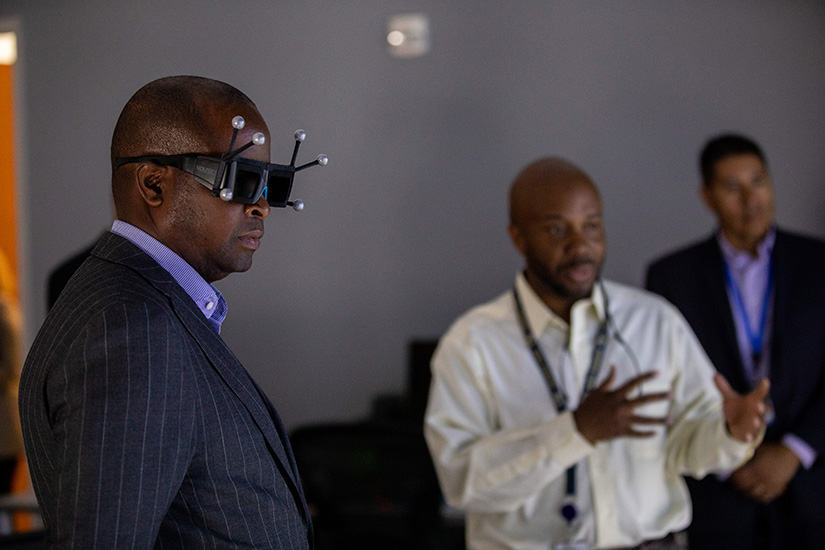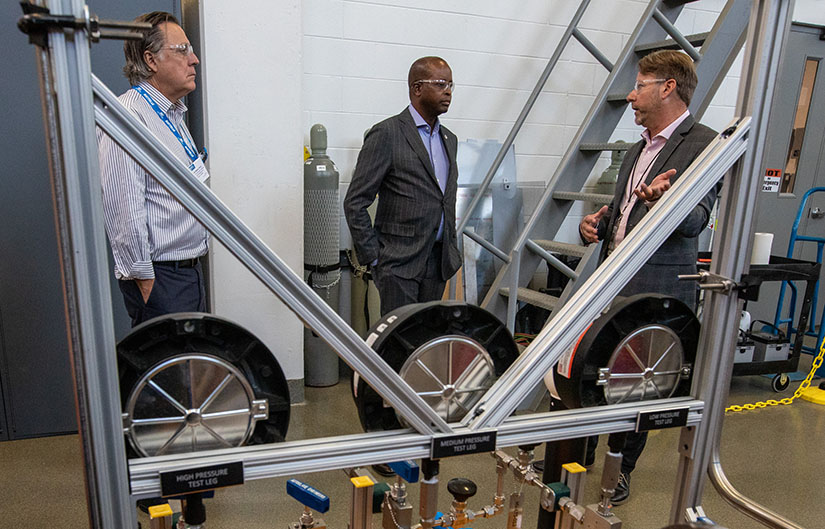Howard University Joins NREL-Governing Alliance Board of Directors

Howard University has joined the Board of Directors of the Alliance for Sustainable Energy in a partnership that will facilitate the exchange of expertise in renewable energy, energy efficiency, environmental justice, and addressing the needs of historically underserved communities.
The Alliance, which operates the National Renewable Energy Laboratory (NREL), is governed by a board that consists of five executives each from parent companies MRIGlobal and Battelle and one each from the University of Colorado, Colorado State University, Colorado School of Mines, Massachusetts Institute of Technology, Stanford University, and now, Howard University.
Founded in 1867 and located in Washington, D.C., Howard University is a private historically Black university (HBCU) that offers 143 programs of study across 14 schools and colleges, with enrollment of about 12,000. It is classified among doctorate-granting institutions as having high research activity. Howard is the top producer of African American undergraduates who later earn science and engineering doctoral degrees, and the university produces more on-campus African American Ph.D. recipients than any other university in the United States.
Howard University President Dr. Wayne A.I. Frederick visited NREL’s South Table Mountain Campus and the future sites of the Global Energy Park and South Table Mountain Energy Park in July 2022, which led to the invitation to join the Alliance’s board.
“We have been talking about diversity, equity, inclusion, and accessibility, and input at the board level is very important,” NREL Director Martin Keller said. “Having an HBCU on the board will give us better insights and allow us to do a better job of inclusion across the laboratory.”

“Howard University has outstanding engineering and science programs, and their addition enhances NREL’s efforts to make reliable and affordable clean energy accessible to all communities,” said Johney Green, associate laboratory directory for Mechanical and Thermal Engineering Sciences. “Howard is one of the first HBCUs to serve on the board of a national laboratory, which is groundbreaking. It’s extremely exciting.”
“Howard will bring its institutional expertise to the board as concerns our commitment to renewable power, energy efficiency, energy systems integration, and sustainable transportation, with an additional focus on environmental justice and historically disenfranchised communities,” said Bruce Jones, the university’s vice president for research.
Building partnerships with Department of Energy (DOE) national laboratories is one of Howard’s strategic goals, Jones said. Howard launched a collaboration centered around faculty research with Brookhaven National Laboratory in 2021 and is developing similar partnerships with Argonne, Idaho, Sandia, Pacific Northwest, Oak Ridge, and Savannah River national laboratories.
Jones envisions opportunities for its faculty and students that include faculty fellowships, internships, and access to state-of-the-art user facilities and equipment. “We also hope to create and develop opportunities for NREL scientists to engage in teaching, visiting lectures, and postdoctoral appointments at Howard University,” he added.
“The NREL professional network will provide untold opportunities for our students and graduates to pursue and secure careers in energy,” Jones said.
Beyond its direct impact on students and faculty, Jones said Howard’s presence on the Alliance board gives HBCUs a greater national voice on energy policy and energy outcomes.
Howard has taken part in the DOE-NREL Minority University Research Associates program since 1998. The program encourages minority undergraduate students to pursue careers in science and technology, pairing them with principal investigators at their institutions to perform research projects on solar technology. The students are then awarded summer internships in industry or at national laboratories such as NREL.
Howard is also taking part in the recently launched Student Training in Applied Research internship program, which provides undergraduate students and faculty at minority-serving institutions hands-on experience with clean energy research over the course of a year. This includes a 10-week summer internship at NREL and eight months of follow-on work during the academic year.
Research in Howard’s College of Engineering and Architecture includes centers focused on artificial intelligence and machine learning, data science and cybersecurity, urban transportation, nanotechnology and its environmental implications, energy systems and control, and power optimization for electrothermal systems.
In January 2023, Howard became the first HBCU to lead a university-affiliated research center, in a partnership with the U.S. Air Force focused on tactical autonomy.
